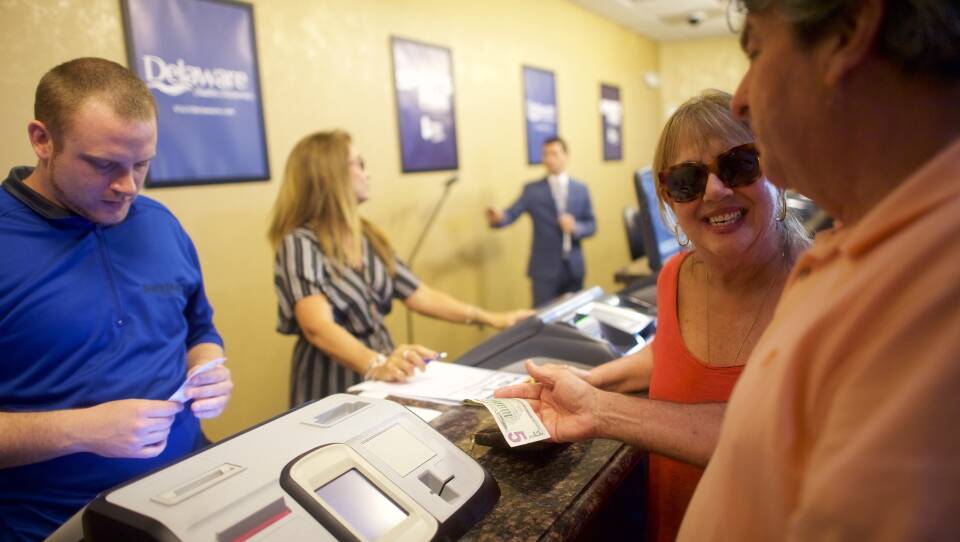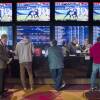As Massachusetts legislators face a looming deadline and work behind closed doors to overcome significant differences on a bill that would legalize sports betting in the state, the gaming industry and others focused on gambling are anxiously waiting to see where the chips fall.
"All eyes in the sports-betting business are in Massachusetts this week," said Casey Clark, senior vice president at the American Gaming Association.
People are already betting on sports in Massachusetts, Clark said. They're just doing it illegally.
"And what this opportunity creates is a way to drive consumers into a safer, regulated marketplace where there are protections for responsible gaming, for helping them understand how to do this in a way that, you know, is a form of entertainment for people," he said. "And the illegal market that's been serving Massachusetts and other jurisdictions across the country for a long time doesn't have any of those restrictions or regulatory oversight."
The sports gambling bills passed by both the Senate and House share many similarities — including allowing people to place bets on sporting events from their phones — but the differences could cause a stalemate. Among the widest gaps between the bills is over the issue of gambling on college sports. The House version includes college sports, and Speaker Ron Mariano has said that's a crucial element of the legislation, while Senate President Karen Spilka has favored the Senate version, which omits college sports.
Legalizing betting on college sports complicates things, said Paul Debole, an assistant professor of political science at Lasell University, whose research has included a focus on gambling regulation.
"Colleges have been exploiting student athletes for decades as a huge revenue center," he said. "College sports betting places additional stresses on that system that needs some serious reform. With mobile sports betting basically being an arm's reach away, how do we make sure that there are people who don't take advantage of that as well?"
Those protections are possible, said Casey Clark of the American Gaming Association. And it's not like betting on college sports isn't already happening, he added.
"Carving out perhaps a more vulnerable population of athletes, more vulnerable competition, away from the regulated marketplace and keeping all of that activity in the illegal, unregulated market, it doesn't serve anybody's interests," he said.
More Local News
In a joint letter this week, the heads of Encore Boston Harbor, MGM Springfield and Plainridge Park Casino urged legislators to send a sports betting legislation to the governor to sign.
"Today, 35 states have legalized sports betting, including the neighboring states of Connecticut, New Hampshire, New York, and Rhode Island, and no resident of the Commonwealth is more than an hour’s drive from a state where legal sports betting is available," they wrote in the letter. "As a result, our competitors in these states are now offering a significant amenity and service we are prohibited from offering in Massachusetts and capturing the Commonwealth’s entertainment dollars once again."
The casino bosses added that is resulting in a loss of tax revenue for Massachusetts.
"Furthermore, it is impacting our ability to build our workforce as employees, despite increased wages, sign-on bonuses and incentives, particularly those working in tipped positions, are choosing to work in venues that draw significantly larger crowds because of sports betting," they wrote. "With less than a week remaining in the legislative session, we respectfully implore you to seize on the opportunity to level the playing field in this hyper-competitive industry."
When legislators first legalized casino gambling in Massachusetts, they required the casino facilities to include staff on-site to help prevent problem gambling. That program, called GameSense , offers resources for compulsive gamblers. It's run by the Massachusetts Council on Gaming and Health, whose executive director, Marlene Warner, said she worries about what would happen if online sports betting were allowed without a version of the program being made available to those gambling remotely.
"[This is] the first way that Massachusetts is in a really massive way going to be moving gambling online," Warner said. "That requires a fair amount of new approaches to responsible gambling, safer gambling practices. And so my hope is that the Legislature continues to take that seriously. The House put some of that in. The Senate went far beyond the House version. So as they're in conference committee, I'm hoping those things are really leading some of those conversations."
As the state considers moving beyond brick-and-mortar facilities, Debole said state lawmakers also must make sure they develop a system that's fair to the existing casino.
"How do we tax mobile sports betting? Are all betting dollars the same? We have expanded gaming where there's a 25% daily tax on casino revenues for Encore and MGM, and a 49% daily tax on slot parlor revenues. So how are we going to tax this sports betting? Is the taxation going to be similar? If so, then I think there may be cause for the casino license holders to want to reconsider, perhaps as a equal protection problem, how they're going to be taxed, too."
Lawmakers have just days left to reach an agreement if they want to legalize sports betting before the end of the session on July 31.









